Mister Monday Read online
Page 7
The Fetchers all started to laugh now, if you could call a rising-falling series of grunts a laugh. Arthur recoiled as their stinking, sickening breath gusted out with each grunt. They obviously thought they’d captured something very important and won a victory.
Glumly, Arthur had to recognise they had. If he was ever to make any sense of what was going on, he needed the Atlas. So he had to get it back. What had the Atlas said about the Fetchers? They couldn’t cross thresholds and –
Salt! Arthur turned to the kitchen shelves. There had to be salt here, and probably lots of it. It was a commercial kitchen. He ran along the shelves, the Key held fast in one hand while he turned bags around and shifted containers with the other. Sugar, four different sorts of flour, spices of all kinds, other grains, dried fruit . . . salt! There it was, a big tub of regular salt and a small sack of rock salt.
Arthur hesitated, then slipped the Key through his belt like a dagger. As soon as he let go, he felt his asthma returning. The deep breaths of a moment ago were lost to him. But he still felt some ease from the Key. Perhaps having it close was better than nothing.
He put the rock salt in his backpack, slipped it on again, then picked up the tub of salt and threw away the lid. The tub was two-thirds full of fine white salt. Arthur held the tub by its handle in his left hand and took a fistful of salt in his right.
Then he marched back to the door, wheezing and panting a little, but prepared for battle. If he could surprise them, he thought, throw the salt across the front rank, he might be able to dash out and grab the Atlas when they . . . well, when whatever the salt did to them happened.
At the back of his mind, a doubting question immediately popped up. What if the salt just annoyed them, and as soon as he jumped out they grabbed him and bit him and scratched him to pieces?
Arthur didn’t answer that question. He forced himself to focus on one thing – getting the Atlas back. Once he had that, he could ask some more questions.
These thoughts were racing through his mind as he came to the end of the shelves. Arthur gulped, took as deep a breath as he could, and jumped out in front of the door, screaming and throwing salt.
‘Yahhhhh!’
Seven
SALT SPRAYED OUT of Arthur’s hand and across the front rank of Fetchers. Their laughter instantly stopped, dissolving into startled yelps and cries. As the salt hit, the Fetchers squealed and fell over one another in a panicked attempt to escape, becoming a tangled mess of shrieking arms and legs and ugly faces that made it even easier for Arthur to throw handful after handful of salt over them.
The salt sizzled on the Fetchers as it struck. Both flesh and the black cloth melted, as if the salt were the most potent acid imaginable. Even a pinchful of salt hitting a Fetcher started a chain reaction that in a matter of seconds reduced the creature to a bubbling pile of nasty-looking scum.
After Arthur threw his ninth or tenth handful of salt, there weren’t any more Fetchers. There were only fourteen hubcap-sized mounds of evil-smelling glop that looked like a cross between elephant dung and hot tar.
Arthur stared at the piles, salt still dribbling from his hand. He could feel his lungs tightening even more, so he took the Key from his belt. As soon as he touched it he felt his chest loosen and his breath come back, free and unfettered. He could still feel an asthma attack lurking, but it was held at bay by the strange power of the Key.
The asthma was a reaction to what had happened, he knew. He was shocked by the effect the salt had on the creatures and unpleasantly reminded of salting the leeches that had attached themselves to his legs on a hiking trip last summer.
He was also repelled and disgusted by the idea that he would now have to search through each mound to find the Atlas.
There was no way he was going to touch those piles with his bare hands. Breathing only through his mouth, Arthur gingerly touched the closest pile with the toe of his shoe. But just as he made contact, the pile shivered and turned into a column of smoke as black and shiny as his school shoes. Arthur leaped back as the smoke formed into a small misty replica of the Fetcher. The tiny replica spun around several times – and disappeared!
Moments later, every mound did the same. As Arthur desperately kicked at the remnants with his foot, the last pile of glop vanished in a twisting puff of smoke.
Now there was just the concrete alley floor. No sign remained of the Fetchers at all. And wherever their salted leftovers had disappeared to, so had the Atlas.
The fire alarms and siren were still going strong, which didn’t help Arthur’s thinking process. There were many additional sirens now as well, and Arthur realised that he could hear helicopters too. The fire must be worse than he’d thought.
Suddenly Arthur remembered Mrs. Banber. She’d been unconscious at the front of the library! He’d been so scared getting away from Noon and the Fetchers that he’d forgotten. He had to tell the firemen that she was in there!
He ran out into the hall again and looked up. As he’d feared, there were huge clouds of smoke boiling out of the smashed doors and out of the library roof as well. The fire must have spread with incredible speed.
Arthur started towards the stairs. He figured that if the Key helped him breathe despite his asthma, it might help him breathe even through the smoke. Maybe it would protect him from fire as well, since it had instantly healed the cut from Noon’s flaming sword.
He hoped it would protect him.
Arthur could hear the deep bellow of the fire inside as he ran up the stairs. A terrible, frightening sound, made worse by the lurid, leaping colours that shone out the door, lighting up the dark smoke.
Arthur was almost at the top of the stairs when he felt something grab his ankle. He fell forward, lost his hold on the Key for an instant, and felt the terrible heat and instant panic as his lungs were compressed by a deathly grip. Then he caught the Key again and with it came relief. He gripped it tightly and wriggled around, ready to slash with the Key, expecting that it was a Fetcher who held his leg.
But it wasn’t. Arthur saw a bright yellow suit, a red helmet, and an indistinct human face behind the visor of a fireman’s breathing apparatus.
‘It’s okay, I’ve got you!’ shouted the fireman, his voice muffled and distant. He lifted Arthur up and over his shoulder. Other firemen edged past, all wearing full suits and breathing apparatus. Some carried axes and extinguishers; others were trailing hoses.
‘Mrs. Banber!’ Arthur coughed, tugging at the elbow of a passing fireman, since he couldn’t even see the face of the one whose shoulder he was across. His momentary loss of the Key had let smoke get in his lungs. He could feel it being cleared out, but obviously the Key could only do so much in a short time. ‘She’s at the front desk!’
The second fireman stopped.
‘What?’ he bellowed, his voice indistinct through the mask.
‘Librarian!’ shouted Arthur. ‘At the front desk.’
‘We’ve got her out already!’ responded the fireman. ‘Was there anyone else inside?’
‘No,’ said Arthur. He was sure no one else had been there. Unless they’d been hiding in the shelves, like he’d hidden from Noon. ‘I don’t think so.’
‘You’ll be okay!’ shouted the fireman, then he was gone, into the smoke and the glow.
Arthur’s fireman carried him down the stairs, along the alley, which was now full of firemen, hoses, and other gear, and out around the side of the library to the front of the school. There were even more firemen there, with four fire engines in the street, three ambulances, six police cars – and parked behind them, a whole row of odd-looking buses. It took Arthur a second to realise that the buses had no windows and no markings.
The fireman took Arthur to an area in the parking lot where there were stretchers ready, lowered him onto one, clapped him on the shoulder, and smiled. Arthur smiled back and realised that the face he was looking at was a woman’s. Then she was gone, back to the fire.
The other stretchers were empty. Ar
thur guessed that they had already taken Mrs. Banber off to the hospital.
Arthur lay on his back on the stretcher. He felt dazed and suddenly very tired. Everything had happened so quickly. He kept a tight hold on the Key, but pushed it up against his leg so it couldn’t be seen.
There were three helicopters hanging in the blue sky almost directly above him. He expected them to be television news choppers, but they weren’t . . .
Arthur sat up. One helicopter was dark green and had ARMY on its belly. The other two helicopters were bright orange and they had large black Qs on their sides and bellies.
Q for quarantine.
Arthur looked around and saw paramedics coming towards him, carrying their first-aid gear, marked with bright red crosses. That was normal. But they were wearing full biohazard suits, with breathing apparatus similar to the fire brigade’s. That wasn’t normal at all.
Arthur felt the fear that was always with him become something else. Now it was a reality, not just a gnawing emotion that he could keep a lid on.
He saw police in their blue biohazard gear, and soldiers as well, in camouflage biosuits. The soldiers were setting up all kinds of equipment, including portable decontamination showers. The police were laying out quarantine tape around the school and directing what had to be the last class to come out of the school on to those windowless buses. All the kids were silent and downcast, without any of the usual carrying on and talking that would accompany an escape from the usual school routine.
Arthur recognised everything that was happening. He’d been too young to see it before in real life, but he’d watched lots of documentaries. He’d read books and looked at pictures. Emily had talked to him about it a lot when he was younger, helping him to understand what had happened to his birth parents and to the world.
This was biocontainment and quarantine. The school was being sealed off and everyone in it was being taken away to a secure hospital. That meant that the Federal Biocontrol Authority had declared an outbreak and had formally assumed control over the situation. They must think the virus had originated in the school, or that the school was a major source of carriers.
It also meant that some people must have already died from the unknown virus. Arthur thought of Leaf’s email, and of Ed. If Leaf was right and the dog-faces . . . the Fetchers had brought the virus . . .
Arthur shut his eyes, remembering what he’d read in the Atlas about the Fetchers.
Less inimical to mortal life than most creatures of Nothing . . .
Inimical meant harmful, and less inimical only meant they weren’t as bad as some other dangers. Like a small earthquake was better than a really big one. Though not if you were right in it. The Fetchers probably had brought some terrible disease. A disease that his mum would be working on, trying to find a vaccine or a cure. But she wouldn’t have a hope if it really was from somewhere else, from some otherworldly source.
Maybe whatever it was could get through all the protective measures and containment in Emily’s lab. Arthur might lose her, lose the only real mother he’d known. Then Bob would get it for sure as well, then his brothers and sisters . . .
‘You okay? Take a breath for me.’
Arthur opened his eyes. Another breathing mask visor, another indistinct face and muffled voice.
‘Yeah, I’m okay,’ he said shakily. Physically at least, he thought, pushing back the panic that was threatening to overwhelm him. He took a breath, once again surprised by how easy it was with the Key held in his hand.
‘Did you breathe in any smoke?’
Arthur shook his head.
‘Are you burned anywhere? Do you have any pain?’
‘No, I’m okay,’ said Arthur. ‘Really. I was outside before the fire got going.’
The paramedic rapidly looked into Arthur’s eyes, attached some sort of tiny electronic diagnostic device to his neck, and checked the skin under his tattered shirt.
‘Lift your arm for me. What’s that?’
‘My metalwork project. If I lose it I’ll fail the course.’
‘Whatever,’ said the paramedic. ‘Lift your other arm. Wiggle your fingers. Okay. Lift your feet.’
Arthur complied with the instructions, feeling a bit like a puppet.
‘You’re in much better shape than you should be after coming out of that,’ said the paramedic as he looked at the readout on the device he’d attached. They both glanced back at the burning library. There was a column of smoke hundreds of feet high coming out of it now. ‘Some people are just lucky, I guess.’
‘Though not that lucky,’ amended the paramedic as a police officer lumbered past, unreeling barrier tape that was marked with fluorescent biohazard trefoils. ‘I’m afraid to say that your school has been listed under the Creighton Act as a Potential Biohazard Threat –’
‘A hot spot,’ interrupted Arthur. Saying it made it easier for him to wrestle his fear under control. Made it a real problem, something that he could analyse and react to, rather than just a nagging, amorphous fear. ‘Are we all being taken into quarantine?’
‘Yeah, that’s right,’ said the paramedic. ‘Hang on. I have to read you your rights as a quarantined citizen.’
He pulled out a plastic card and squinted at it, holding it close to his faceplate.
‘Okay, here we go. “You are hereby detained under the Creighton Act. You have the right to electronic communication while held in quarantine and you have the right to appeal that quarantine. You may not be held in quarantine for more than 365 days longer than the incubation period of the disease or agent for which you have been quarantined without formal extension by a Federal court. While in quarantine any action that you may undertake that may violate that quarantine or endanger the health of others is a Federal offence for which any penalty up to and including the death penalty may be applied.” Do you understand?’
‘Yes,’ said Arthur slowly. His word seemed to hang in the air, heavy between them. It was one of the most significant things he’d ever said, Arthur realised.
He’d studied the Creighton Act at school. It was a leftover from the flu epidemics that had killed his birth parents. It had almost been repealed several times since then, as there had been no new outbreaks of any consequence, and because it gave the government tremendous powers over quarantined citizens. The last part about the death penalty was particularly controversial, as it had been used to retrospectively justify shooting people who tried to escape quarantine.
Like me, if I try to get away now. But if he didn’t get to the House and find out what was going on, there might never be a cure for the virus the Fetchers had brought with them.
‘What are we being quarantined for?’ Arthur asked as he slid off the stretcher and stood up.
‘We don’t know yet,’ replied the paramedic. He was looking away from Arthur, and his voice was very indistinct through his mask. ‘It starts like a very bad cold, which lasts for a few days. Then the patient goes to sleep.’
‘That doesn’t sound so bad.’
‘We can’t wake them up,’ said the paramedic grimly. ‘Nothing works.’
‘But sleep is good for you . . .’ Arthur started to say. Halfheartedly, trying to convince himself.
‘We can’t make them eat or drink, and they don’t absorb anything intravenously as they should,’ continued the paramedic. ‘No one knows why.’
Arthur stared at the paramedic. Even through the mask, he could see that the man was afraid.
‘All of the cases are connected with this school – I shouldn’t be telling you this,’ said the paramedic. ‘Don’t worry about it. The quarantine will work. We’ll find a cure.’
He doesn’t believe it, thought Arthur. He thinks we’re all going to die.
The medic took the diagnostic unit off Arthur’s neck, checked the readout again, and dropped it into a bin nearby that had the barbed trefoil sign of hazardous biological waste. His hand was trembling as he pointed to the buses.
‘Go and report to Sergeant Hu,
by the bus there.’
‘Yes, sir.’
Arthur walked slowly over toward the policeman who was with three or four kids by the door of the last bus, thinking furiously. He had to do something. He was the only person who could do anything about this outbreak. But what?
He glanced back at the burning library as he desperately tried to work out a plan. The smoke was still a mighty column, but a wisp of it was curling out to one side, as if it were being pulled like a strand of cotton candy. Then that strand was suddenly twisted and stretched and bent in ways no normal smoke would ever follow.
The smoke was forming letters, Arthur realised. Complete words. He rapidly looked around and noticed no one else was looking in the same direction. Perhaps, as with the Fetchers, only he could see this happening.
The words were compressed and overlapped one another, so it was a bit difficult for Arthur to work out what they said. Then it became clear.
Arthur. Get near the House and I will help you. Will
‘Easy for you to say,’ muttered Arthur, and the smoky words broke apart and drifted off like regular smoke once more.
It was much easier said than done. First of all, Arthur had to get out of quarantine without being shot or stunned. Once he was on that bus, it would be almost impossible to escape.
All sorts of possibilities raced through his head. But most of them were imagined scenes of himself running away from the bus, all the policemen and soldiers shouting and chasing him, one of them finally drawing a gun and then a fusillade of shots . . .
There had to be another way. Arthur slowed down so he would have more time to think. He was halfway there, he had less than a minute of freedom. There had to be an answer. Could he use the Key in some way?
He looked down at it, keeping it by his side, and realised he had another problem. The police officer was searching all the kids before they got on, and there was a pile of small knives, mace sprays, and other stuff by his feet. A lot smaller pile than he would have got from Arthur’s old school, and no guns, but still quite a few deadly weapons.

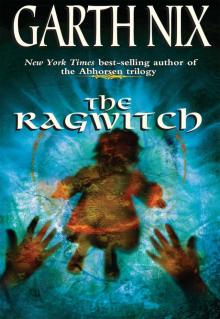 The Ragwitch
The Ragwitch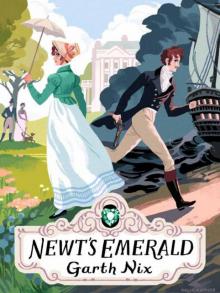 Newt's Emerald
Newt's Emerald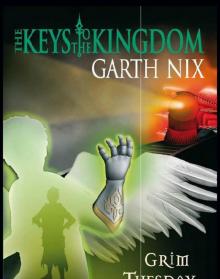 Grim Tuesday
Grim Tuesday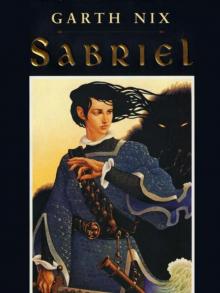 Sabriel
Sabriel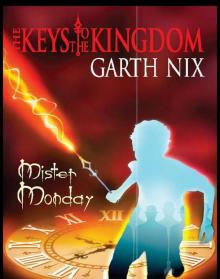 Mister Monday
Mister Monday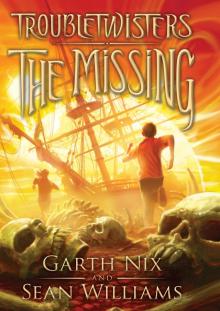 The Missing
The Missing The Fall
The Fall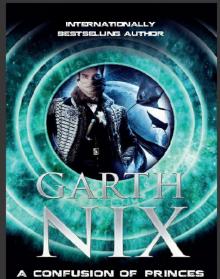 A Confusion of Princes
A Confusion of Princes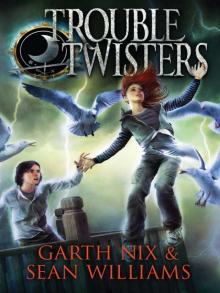 Troubletwisters
Troubletwisters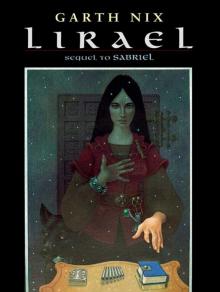 Lirael
Lirael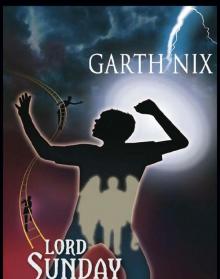 Lord Sunday
Lord Sunday Clariel
Clariel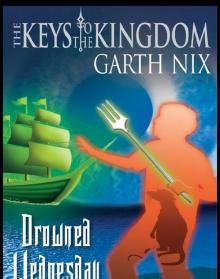 Drowned Wednesday
Drowned Wednesday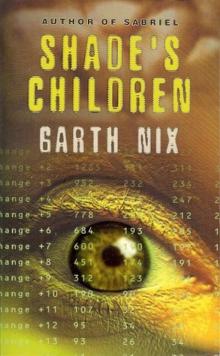 Shade's Children
Shade's Children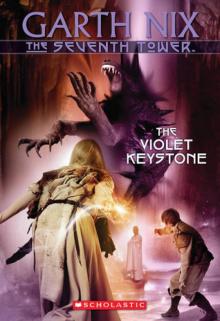 The Violet Keystone
The Violet Keystone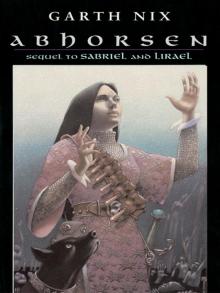 Abhorsen
Abhorsen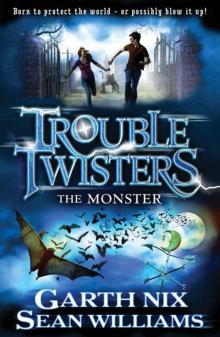 The Monster
The Monster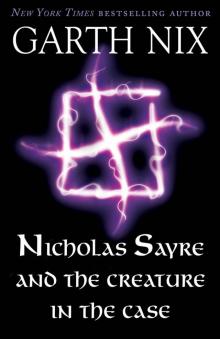 The Creature in the Case
The Creature in the Case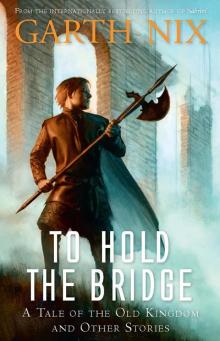 To Hold the Bridge
To Hold the Bridge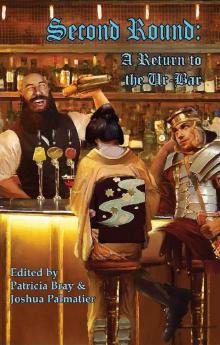 Second Round: A Return to the Ur-Bar
Second Round: A Return to the Ur-Bar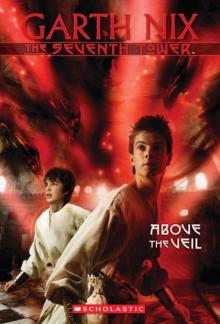 Above the Veil
Above the Veil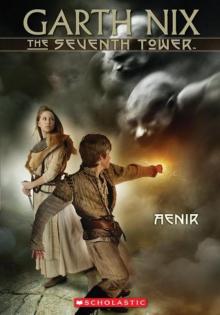 Aenir
Aenir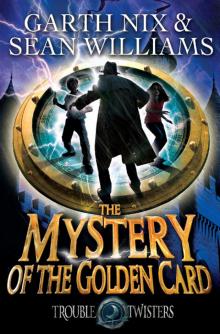 Mystery of the Golden Card
Mystery of the Golden Card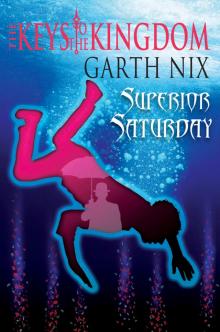 Superior Saturday
Superior Saturday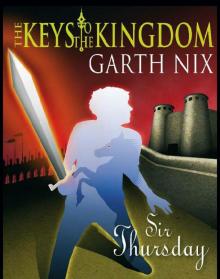 Sir Thursday
Sir Thursday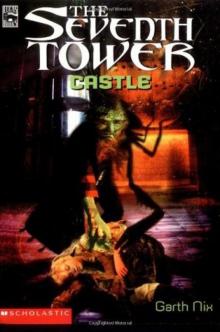 Castle
Castle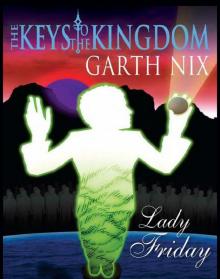 Lady Friday
Lady Friday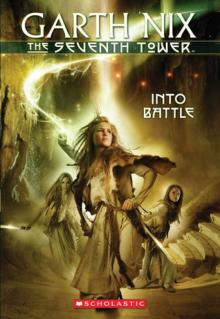 Into Battle
Into Battle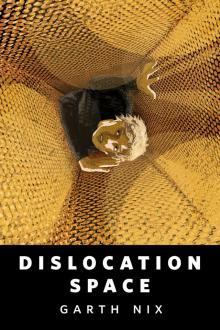 Dislocation Space
Dislocation Space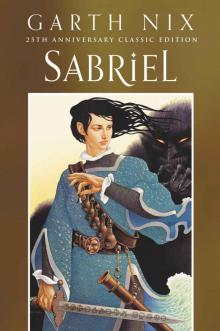 Sabriel (Old Kingdom Book 1)
Sabriel (Old Kingdom Book 1)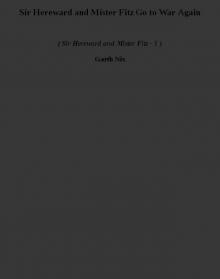 Sir Hereward and Mister Fitz Go to War Again shamf-1
Sir Hereward and Mister Fitz Go to War Again shamf-1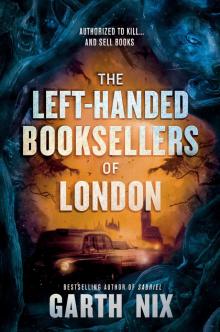 The Left-Handed Booksellers of London
The Left-Handed Booksellers of London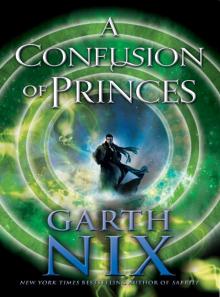 Novel - A Confusion of Princes
Novel - A Confusion of Princes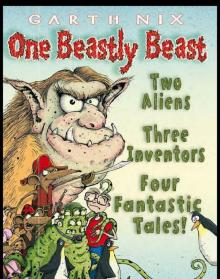 One Beastly Beast
One Beastly Beast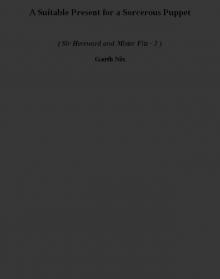 A Suitable Present for a Sorcerous Puppet shamf-3
A Suitable Present for a Sorcerous Puppet shamf-3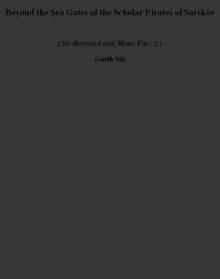 Beyond the Sea Gates of the Scholar Pirates of Sarsköe shamf-2
Beyond the Sea Gates of the Scholar Pirates of Sarsköe shamf-2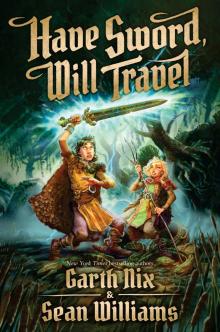 Have Sword, Will Travel
Have Sword, Will Travel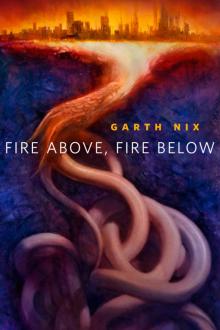 Fire Above, Fire Below
Fire Above, Fire Below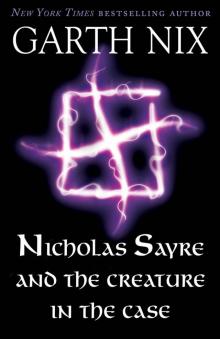 Nicholas Sayre and the Creature in the Case
Nicholas Sayre and the Creature in the Case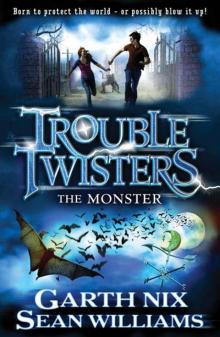 The Monster (Troubletwisters)
The Monster (Troubletwisters)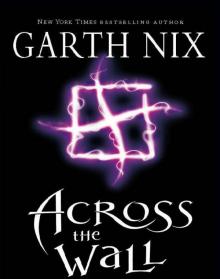 Across the Wall
Across the Wall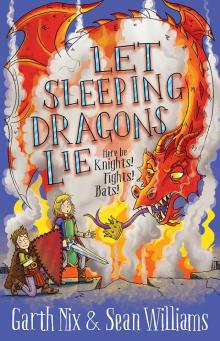 Let Sleeping Dragons Lie
Let Sleeping Dragons Lie![[Abhorsen 03a] - Across the Wall Read online](http://i1.bookreadfree.com/i2/04/12/abhorsen_03a_-_across_the_wall_preview.jpg) [Abhorsen 03a] - Across the Wall
[Abhorsen 03a] - Across the Wall